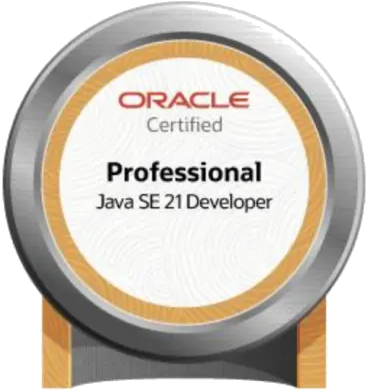1Z0-830

| Formats: | Asynchronous |
| Blended | |
| Online | |
| Onsite | |
| Part-time | |
| Level: | Intermediate |
| Prerequisites: | |
| Recommended Knowledge | |
| Java Fundamentals | |
Formats: We offer our training content in a flexible format to suit your needs. Contact Us if you wish to know if we can accommodate your unique requirements.
Level: We are happy to customize course content to suit your skill level and learning goals. Contact us for a customized learning path.
Java SE Developer (Intermediate) (1Z0-830)
Our Java Intermediate Training course is designed for individuals who already possess a foundational understanding of Java and are looking to deepen their skills in advanced programming concepts and modern Java features. This course is ideal for junior to mid-level developers.
Target Audience and Prerequisites
This course is tailored for individuals who:
- Have a foundational understanding of Java.
- Are junior to mid-level developers.
- Want to deepen their skills in advanced Java concepts.
Prerequisite: Prior experience with Java basics is recommended. If you're unsure about your current Java skills, we recommend reviewing basic Java concepts before starting the course. Consider our Java Fundamentals course if you need to brush up on the basics.
What You Will Learn
By mastering the skills taught in this course, you will be well-prepared to tackle real-world programming challenges with confidence. You'll gain expertise in:
- Advanced object-oriented programming principles and design patterns.
- Working effectively with Java data types, including text manipulation.
- Controlling program flow and managing object lifecycles.
- Exception handling and best practices.
- Using collections, generics, streams, and lambda expressions.
- Developing modular applications with the Java Platform Module System.
- Concurrency and thread management.
- Input/output operations and file handling.
- Secure coding practices.
- Database interaction with JDBC.
- Localization and internationalization.
- Working with annotations.
Benefits of Attending
By attending this course, you will:
- Enhance your Java programming skills and knowledge.
- Gain expertise in advanced Java concepts and modern features.
- Improve your ability to design and develop robust applications.
- Increase your career opportunities as a Java developer.
Flexible Learning Options and Affordability
We offer flexible learning options to suit various schedules and learning preferences:
- Self-Paced Learning
- Mentor-Led Sessions
- Instructor-Led Training (Remote or In-Person)
We also offer affordable training solutions.
Affordable Training
We offer self-paced, mentored or
Instructor-led, remote or in-person courses
Allow our experts to guide you in mastering Java.
Java SE 21 Developer (1Z0-830) Training Course Outline
- Java Language and Platform Basics
- Java Platform Architecture (JDK, JRE, JVM)
- Compiling and Executing Java Code
- Java Development Kit (JDK) Tools
- Working with the Command Line
- Integrated Development Environments (IDEs)
- Operators and Expressions
- Arithmetic Operators
- Relational Operators
- Logical Operators
- Assignment Operators
- Operator Precedence
- Type Casting and Conversion
- Instanceof operator
- Control Flow
- Conditional Statements (if, else if, switch)
- Switch Expressions
- Looping Constructs (for, while, do-while)
- Enhanced for Loop
- Break and Continue Statements
- Object-Oriented Programming
- Principles of OOP (Encapsulation, Inheritance, Polymorphism, Abstraction)
- Classes and Objects
- Declaring and Instantiating Objects
- Object Lifecycle (Creation, Garbage Collection)
- Fields and Methods (Instance, Static, Overloaded)
- Constructors and Initializers
- Variable Scopes
- Making Objects Immutable
- Classes and Objects
- Nested Classes (Inner, Static)
- Anonymous Classes
- Local Classes
- Inheritance
- Superclasses and Subclasses
- The `extends` Keyword
- Overriding Methods
- The `super` Keyword
- `Object` Class and its Methods
- Polymorphism
- Dynamic Method Dispatch
- Casting Objects
- `instanceof` Operator
- Encapsulation and Information Hiding
- Access Modifiers (public, protected, default, private)
- Encapsulating Data
- Interfaces
- Defining Interfaces
- Implementing Interfaces
- Functional Interfaces
- Default Methods
- Static Methods in Interfaces
- Private Methods in Interfaces
- Lambda Expressions and Functional Interfaces
- Lambda Expressions Syntax
- Using Functional Interfaces
- Method References
- The `java.util.function` Package
- Collections
- The Collections Framework
- Lists (ArrayList, LinkedList)
- Sets (HashSet, TreeSet)
- Maps (HashMap, TreeMap)
- Queues and Deques
- Choosing the Right Collection
- Generics
- Generic Classes and Interfaces
- Type Parameters
- Wildcards
- Bounded Types
- Streams API
- Creating Streams
- Intermediate Operations (map, filter, sorted)
- Terminal Operations (collect, forEach, reduce)
- Collectors (groupingBy, partitioningBy)
- Parallel Streams
- Exception Handling
- `try-catch-finally` Blocks
- `try-with-resources` Statement
- Multi-catch Blocks
- Custom Exceptions
- Throwing Exceptions
- Input/Output
- Working with Files
- I/O Streams (Byte Streams, Character Streams)
- Reading and Writing Data
- Serialization
- `java.nio.file` API
- Concurrency
- Threads
- Thread Lifecycle
- Thread Synchronization
- `java.util.concurrent` API
- Executors and Thread Pools
- Locks and Atomic Variables
- Virtual Threads (Project Loom)
- Structured Concurrency
- Modules
- The Java Platform Module System (JPMS)
- Defining Modules
- Module Declarations
- Module Paths
- Services
- JDBC
- Connecting to Databases
- Working with `Statement`, `PreparedStatement`, and `CallableStatement`
- Executing Queries
- Processing Results
- Transactions
- Security
- Secure Coding Practices
- Common Vulnerabilities (e.g., Injection Attacks)
- Input Validation
- Authentication and Authorization
- Localization
- `Locale` Class
- Resource Bundles
- Formatting Dates and Numbers
- Testing
- Unit Testing Concepts
- Using a Testing Framework (e.g., JUnit)
- Garbage Collection
- Garbage Collection Algorithms
- Understanding Garbage Collection
- Tools for Monitoring Garbage Collection
- Java 21 Features
- Record Patterns
- Pattern Matching for switch
- Sealed Classes
- Text Blocks
- Switch Expressions
- Unnamed Patterns and Variables
- String Templates (Preview)
- Scoped Values (Incubator)